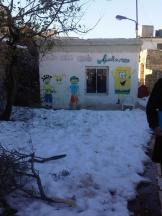Israeli law requires children from the age of 3-4 to attend school, except in the state within the state: the Hebron settlers’ state, which runs Israel and its army. How come?
Some history in a nutshell: Hebron is the only city in the occupied territories in which Jews have been living since 1968 with the agreement and encouragement of every Israeli government. It goes without saying how difficult the lives of Hebron’s Palestinians have been as a result.
In 1997 the city was divided into two parts: H1 for Palestinians, which they themselves administer; H2 for the settlers (who then numbered about 750 persons) and their non-Jewish neighbors in Tel Rumeida/Beit Hadassah and the surrounding area (whose number was about 30,000). But there are two sets of laws in H2: Israeli law for Jews, and military law for their non-Jewish neighbors.
If, before the city was divided, the Palestinians suffered from restrictions on their daily life, afterwards their situation became much worse. For example, they’re not allowed to establish any new educational institutions. There can be only one reason for this prohibition – to make Palestinians leave in order to expand Jewish settlement and allow it to erase Palestinian life, instead - God forbid - of seeking ways to coexist.
How and why are Palestinian kindergarten children categorized as a “security threat”?
A., an electrical engineer by training and a resident of Tel Rumeida, is an educator, like many members of his family. In recent years he’s been involved in community activities, and not long ago began organizing residents of the neighborhood to improve the quality of their life, with some success. They located an abandoned, dilapidated building next to the Cordova school, repaired, renovated, painted and furnished it a little so 29 kindergarten-age children from the neighborhood would have an educational framework instead of sitting at home doing nothing until they were 6 years old. A. said that neither the DCO nor the police expressed any objections.
But, since the kindergarten overlooks Beit Hadassah and the other educational institutions attended by the settlers’ children, the settlers, as expected, began sabotaging the renovation work. They came up the stairs, sprayed insults on the walls, rioted, even called the army and came with the soldiers to demand that the residents stop the renovations and not open the kindergarten. The Hebron brigade commander also honored them with his presence – twice - demanding they leave. The kindergarten is a security threat. It isn’t allowed – heaven forbid that tiny children should be educated there.
A. and his colleagues aren’t giving up. The kindergarten is open and operating, with no equipment and almost without heat, run by two kindergarten teachers and two volunteers.
We visited the kindergarten after the cold wave. Snow still covered the path, and the cement wall alongside was already covered with abuse: “Death to Arabs,” signed with Stars of David. Hebron’s settlers, under the army’s auspices, continue their violent forays, but A. and his colleague, G., are determined to continue operating the kindergarten.
When we walked down the broken, dangerous steps from the kindergarten to Shuhadah Street we stood opposite Beit Hadassah. G. looks at the building, mutters with a smile: “You know, my grandparents were friends of Rabbi Bajayo and saved members of the Ezra family during the 1929 riots. We’re still in contact with their descendants throughout Israel.”
The settlers who give orders to the army don’t care. We felt mostly shame. Before leaving we promised to try to obtain equipment and heaters for them.
It might be possible to overcome fear and a desire for revenge, but not stupidity and evil. Why else would someone conclude that kindergarten children are a security threat?
